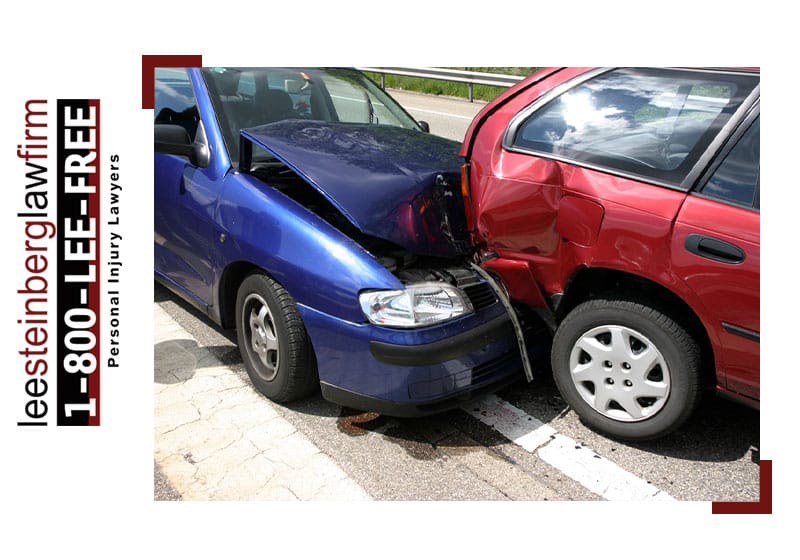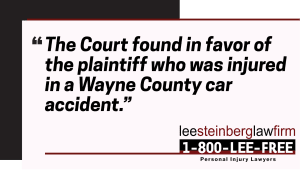
The Michigan Supreme Court came out with an important ruling last month. In the case of Wilmore-Moody v. Zakir, the Court found in favor of the plaintiff who was injured in a Wayne County car accident.
The case involved a lot of detailed and confusing insurance issues, touching on things like insurance fraud, rescission, and when a person is eligible for pain and suffering compensation following a Michigan car crash. This decision will help future individuals injured by the negligence of another driver. Our Michigan insurance lawyers explain the Moody decision in detail below.
Case Details
In the case, the plaintiff, Adora Wilmore-Moody, was injured when a vehicle driven by Zakir rear-ended Ms. Moody’s vehicle. The plaintiff sustained injuries to her head, neck and back. At the time of the crash, the plaintiff had auto insurance with Everest National Insurance Company.
Ms. Moody turned to Everest National for the payment of first-party no-fault benefits. She also filed a negligence lawsuit against the at-fault driver, Zakir. The negligence lawsuit was for pain and suffering compensation.
The Insurance Company Denied Car Accident Claim Based on Fraud
After Ms. Moody filed her lawsuit, Everest National filed a motion to dismiss the first-party claim, arguing it had a right to rescind the insurance policy due to a material misrepresentation she made when she applied for insurance. According to Everest, Ms. Moody failed to disclose that her teenaged granddaughter was living with her when she took out the policy. If she had disclosed this, Everest would have charged her additional premiums of $1,532 for 6 months of coverage.
The Wayne County judge overseeing the case granted Everest National’s motion and allowed Everest to rescind the insurance policy. Everest was permitted to use an equitable remedy known as recission. Rescission acts as a way for one side to “tear up” an insurance contract and restore the parties to the position they would have been in if the contract was never made. In other words, Everest National got out of having to pay all first-party PIP benefits to Ms. Moody.
The Negligent Driver Then Got His Case Dismissed
Following this ruling, Zakir also moved to get the negligence case dismissed. Under Michigan law, a person who is operating their own uninsured motor vehicle at the time of the injury is not allowed to obtain pain and suffering compensation against the at-fault driver. The law that describes this is MCL 500.3135(2)(c) which states:
Damages must not be assessed in favor of a party who was operating his or her own vehicle at the time the injury occurred and did not have in effect for that motor vehicle the security required by section 3101(1) at the time the injury occurred.
The defendant reasoned that because the no-fault insurance contract was rescinded, and the plaintiff no longer had the required insurance “at the time injury occurred,” the plaintiff was barred from recovering third-party noneconomic damages. The trial court agreed and dismissed Ms. Moody’s negligence case as well.
Ms. Moody appealed to the Michigan Court of Appeals. In an unpublished decision, the Court upheld the trial court’s decision to dismiss the first-party case. However, it reversed the trial judge’s decision to dismiss the third-party negligence case, allowing Ms. Moody to move forward with her pain and suffering case. Zakir then appealed this decision to the Michigan Supreme Court.
A Negligent Driver Is Still Responsible Even If the Plaintiff’s Policy is Rescinded

In a unanimous holding, the Michigan Supreme Court held that Ms. Moody was permitted to move ahead with her pain and suffering negligence case against Mr. Zakir even though her auto insurance policy had been rescinded.
In reaching this decision, the Court looked at the language of the MCL 500.3135(2)(c). It found the statute uses the past-tense phrase “at the time the injury occurred” twice. Clearly, the legislature wanted to make sure drivers had insurance at the time of the injury when making a claim for non-economic damages. And Ms. Moody did have insurance with Everest National when the crash happened.
Because of this, Ms. Moody was entitled to make her claim for pain and suffering. A Michigan insurance lawyer can help her get what she is entitled to.
Insurance Policies Are Contracts
Zakir argued that Everest’s after-the-fact- rescission of the insurance policy meant the plaintiff was uninsured “at the time the injury occurred.” But the Supreme Court rejected this argument.
First, Mr. Zakir was not a party to the insurance contact. The parties were Ms. Moody and Everest National. And because of this, Mr. Zakir could not benefit from any of the contractual remedies, such as rescission.
Second, the negligent driver Zakir was completely unaffected by Ms. Moody’s misrepresentations to Everest National and its decision to seek a rescission of the insurance contract. Given Zakir was not a party to the contract, he was not allowed to rely on Everest’s decision to rescind the policy.
In fact, the Court cited a very old case from 1949, Whitley v. Tessman, 324 Mich 215, which held that third parties who are not defrauded may not “mak[e] themselves the avengers of some alleged wrong.”
The Moody case will be used by Michigan insurance lawyers to ensure people have full access to justice after a car accident.
The Case is a Win for Michigan Car Accident Victims
The Moody decision is a big win for individuals injured due to the negligence of another driver. Ms. Moody did not ask to be rear-ended. Her ability to get her medical bills and lost wages were already taken away when the first-party case was dismissed and not reinstated.
It makes no sense for innocent people injured in a Michigan car crash to not have access to compensation for their physical pain and suffering, emotional distress, and trauma. Especially when the person had auto insurance at the time of the crash.
The Michigan Legislature Needs to Amend this “Drunk Driving Shield” Law
Although the Moody decision does not address this, in my opinion all of MCL 500.3135(2)(c) should be reconsidered. Michigan is the only state I am aware of that does not allow a person to get pain and suffering compensation against a negligent driver simply because their own vehicle did not have insurance.
Think of the ramifications. A drunk driver runs a red light and collides into a mother of 3 children at an intersection. The mother dies at the scene. The mom could not afford car insurance and so her vehicle was uninsured. The mother’s children cannot get any compensation for her death. None.
This type of injustice happens every day in Michigan. The number of innocent victims left with no recourse for justice due to this ridiculous law is tremendous. It needs to change. Prior to 1996, drivers could be pain and suffering in these situations. Michigan needs to go back to the old rule.

Lee Steinberg Law Firm: Michigan Insurance Lawyers That Can Help
Our team of Michigan insurance lawyers have been helping individuals injured in a car accident for almost 50 years. We handle these cases every day. We understand the law and the tactics insurance companies use to get out of paying.
Call us at 1-800-LEE-FREE (1-800-533-3733) for a free consultation. We are here to answer your questions. And there is never ever a fee until we win your case.

